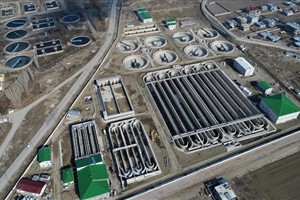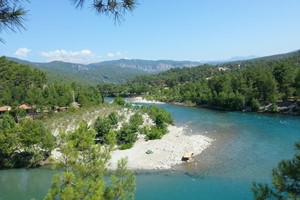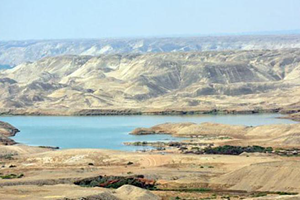Water is an essential component of Turkey's economy and environment. The country's annual average potential of economically exploitable water resources is 112 billion m3.
Annual freshwater consumption is about 44 billion m3, of which 74 percent is used for agriculture, 15 percent for domestic uses, and 11 percent towards industrial ones. Besides its contribution to economic production, water and its related ecosystems (e.g. lakes, wetlands, coastal zones, etc.) provide a wide range of benefits such as flood protection, pollution abatement, and biodiversity conservation.
Water resources are under strong pressure in terms of both quantity and quality. Throughout the country, water resources are unevenly distributed in time and space, and the rivers often have irregular flows due to climate conditions and variations in topography. Surface and groundwater resources are fairly limited in the highly urbanized and industrialized western part of Turkey.
In addition, recent studies demonstrate that in the near future, Turkey will become hotter, more arid, and unstable in terms of its precipitation patterns, meaning that water will inevitably become a very sensitive and critical issue. The above factors, along with population growth (100 million people by 2030), are expected to reduce water availability in many areas.


This is particularly important for basins such as Marmara Basin, K. Menderes Basin and Asi Basin, where water availability is already less than 1000 m3 /capita. In addition, water pollution due to the discharge of untreated wastewater from urban and industrial areas is another problem associated with the growing economy. Freshwater productivity in Turkey (USD20/m3) is low compared to that of high-income countries (USD47/m3), and of some upper middle-income countries of the region, such as Belarus, and Bosnia and Herzegovina (USD50-58/m3) (World Bank, 2016).
As the largest user of water, agriculture has extensive irrigation systems, however the existing irrigation practices are not very efficient. Water delivery systems in irrigation schemes are comprised of classical open canals and canalettes resulting in high losses due to leakage and evaporation. Similarly, at the farm level, surface irrigation methods that have low water efficiency are widely used. Without significant improvement in irrigation efficiencies, it is indisputable that water availability would become a serious constraint for Turkey.
The Turkish government is considering a set of policy issues related to water resource management (WRM), including estimating the economic value of water and incorporating this into strategic decision-making on water allocation and pricing. There is a request for developing a tool for water valuation and accounting. According to a diagnostic analysis the World Bank carried out in 2014, there is a wide range of policy questions related to water resource management, from water's economic contributions to national growth, to tradeoffs among competing users in managing water resources, to water pricing and cost recovery, to planning and prioritizing investments to compensate for or offset the loss of water due to depletion. The need for water-related policy analysis and decision-making from the agencies responsible for development planning, water resource management, and environmental protection are a strong motivation for the development and application of the water valuation and accounting tool.
Economic valuation of water is a basic step in making well-informed policy decisions on WRM. Government agencies, namely the Ministry of Development (MoD) / TurkStat, Ministry of Forest and Water Affairs (MoFWA), are keen on conducting valuation to better understand 10 water resources' economic contributions to the economy and to accordingly modify the national accounts. Furthermore, MoD and MoFWA are willing to integrate water valuation as a key component in the river basin management processes, which would contribute to analyzing the challenging issues of WRM such as assessing trade-offs, allocation planning, investment prioritization, ecosystem conservation, setting standards for water quality, water pricing, compensation for damage or use, and adaptation to climate change. To support the government agencies in natural resources management, the World Bank launched a natural capital accounting (NCA) program in Turkey. The program aims to improve the valuation and accounting systems of natural resources.














